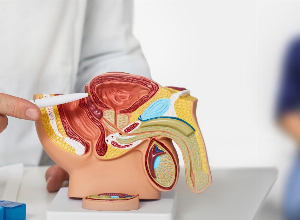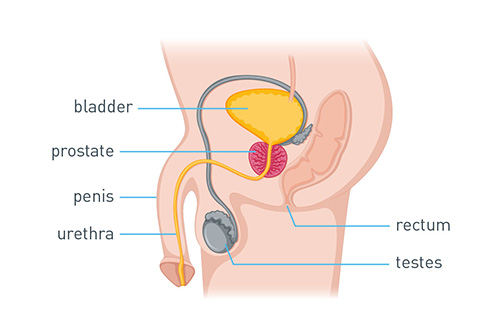Prostate cancer: risk factors, symptoms, diagnosis
Published Jul 7, 2023 • By Claudia Lima
The prostate is the largest gland in the male urogenital system. It plays a role in a man's reproductive, sexual and urinary functions.
With age, it can grow and cause health complications. One possible complication is prostate cancer, the most common form of male cancer.
What is the role of the prostate? What is prostate cancer and what are its symptoms? How can it be treated?
Find all the answers in our article!

What is the prostate? What is its role?
The prostate is an organ found only in men. It is located below the bladder, in front of the rectum, and surrounds the urethra, which carries urine from the bladder to the outside.

Source: epworth.org.au
The prostate is an exocrine gland that produces prostatic fluid, stored in the seminal vesicles, which keeps sperm alive and helps them to leave the body during ejaculation.
Its size increases with age, rising from an average of 15g at the age of 15 to 60-70g at the age of 80. This increase in size and the change in its elasticity are at the root of several urinary problems.
The prostate can be the site of three main diseases: prostate cancer, adenoma or benign prostatic hypertrophy and prostatitis.
What is prostate cancer? What are the risk factors?
Prostate cancer is a disease that develops from the cells of the prostate gland, which are initially healthy, but then transform and multiply in an uncontrolled way, until they form a mass called a malignant tumor.
In most cases, it is an adenocarcinoma, i.e. it develops from the cells of the gland. The tumor is initially confined to the prostate. Over time, the tumour grows and may extend beyond the prostate capsule. Cancer cells may break away from the tumor and travel through blood or lymph vessels to invade other parts of the body.
Worldwide, prostate cancer is the 2nd most common cancer in men, behind lung cancer. It has a good prognosis, with a 5-year net survival rate of over 90%, and the disease often progresses slowly.
Certain factors represent individual risks for developing prostate cancer. The presence of one or more risk factors does not systematically lead to the development of this type of cancer.
These individual risk factors include:
Age
Age is the main risk factor identified for prostate cancer. Prostate cancer is called the cancer of the elderly, rarely appearing before the age of 50, and the incidence increases very rapidly with age. The average age at diagnosis is almost 70.
The man's height
Taller men are also thought to be at a higher risk of developing a prostate tumor. Factors like growth rate during childhood and genetics are responsible for an increased risk of prostate cancer.
Ethnic background
Sub-Saharan Africa and the West Indies have higher incidences than the global average. Men of Afro-Caribbean origin have an increased risk of developing this type of cancer. Northern Europeans and North Americans are also at increased risk.
Family history
Men who have first- or second-degree relatives with prostate cancer have an increased risk of also being affected by the disease.
Other risk factors are suspected, such as overconsumption of dairy products or cold meats, smoking, as well as excess weight and obesity, and abdominal adiposity. But more scientific studies are needed to confirm their influence.
Genetic mutations such as HOXB13 and BRCA2 are also associated with prostate cancer.
And since 2021, occupational exposure to pesticides used in agriculture (e.g. chlordecone) has also been recognized as a risk factor for prostate cancer.
No preventive measure has been shown to be beneficial in the development of prostate cancer.
What are the symptoms of prostate cancer?
In most cases, prostate cancer develops without causing any alarming symptoms.
As cancer progresses, it can cause a number of signs and symptoms, such as:
- Frequent need to urinate, especially at night (pollakiuria),
- Low urine output,
- Urinary tract infections (cystitis, prostatitis or pyelonephritis),
- Difficulty urinating or urine retention,
- Painful urination (dysuria),
- The feeling of not having completely emptied your bladder,
- Urinary leakage or incontinence,
- Blood in the urine (hematuria) or semen,
- Painful ejaculations, sometimes with erectile dysfunction,
- Pain in the pelvis, hips, upper thighs or bones.
When prostate cancer has invaded other organs, the patient may suffer from fatigue, nausea, weight loss and loss of appetite, etc.
You should speak to your GP if you experience any of these symptoms. If the doctor considers it necessary, he or she will prescribe tests to determine the cause of your symptoms and provide appropriate treatment. They may also refer you to a urologist for more in-depth tests.
How can prostate cancer be diagnosed and treated?
Prostate cancer is most often discovered during a routine screening.
A digital rectal examination is the first step in the search for prostate cancer. Men over the age of 50 are advised to have their GP carry out a rectal examination once a year, to detect the disease at the earliest possible stage.
If the doctor has any doubts, he or she will prescribe a PSA (Prostate Specific Antigen) blood test. Prostate cancer may be the cause of an elevated PSA level (above 4 ng/ml), but this is not necessarily the only possible reason for the increase of PSA. Then there come additional examinations such as transrectal ultrasound and prostate biopsy.
Today, health authorities do not recommend systematic screening for prostate cancer.
Once diagnosed, there are several treatments for prostate cancer: surgery, radiotherapy, hormone therapy and, more rarely, chemotherapy. But new treatments are being assessed, such as focused ultrasound, or cryotherapy, which involves freezing the tumor. In some cases, the only therapeutic measure taken is active surveillance.
Patients who have undergone treatment for prostate cancer are closely monitored for several years, in order to detect any recurrence at an early stage. Prostate cancer and its treatment have an impact on sexuality and fertility. Special support for sexual issues related to the disease is often provided, and certain measures to prevent infertility can be taken.
Share your thoughts and questions with the community in the comments below!
Take care!

 Facebook
Facebook Twitter
Twitter


